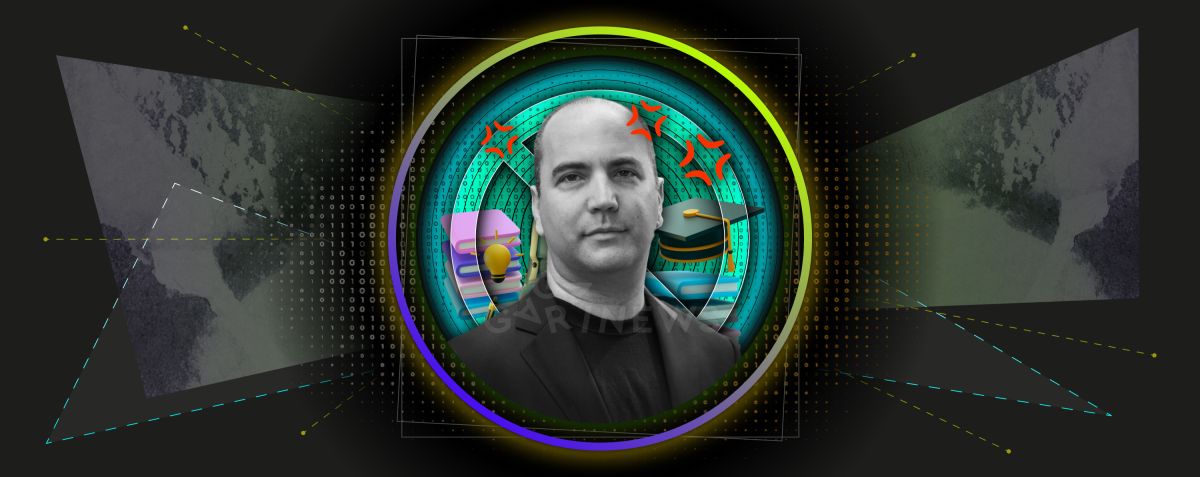Bram Cohen: I hated school and dropped out of college

Bram Cohen, a self-taught high-functioning autistic, conceived and implemented several IT industry revolutions. His motto is: Give and ye shall receive!
On this page
Source: criptonoticias
Dossier by GNcrypto
Bram Cohen
Things Cohen is known and famous for: the creation of the BitTorrent P2P protocol, the BitTorrent P2P program, Chia cryptocurrency, and numerous hacker conferences.
Home: San Francisco, USA
Date of birth: October 12, 1975 (age 47)
Family status: Married, has three children
Hobbies: origami, juggling, recreational mathematics
Favorite programming language: Python
Special characteristics: Asperger's Syndrome
Cohen's childhood: a message of hope for little social outcasts
Sustained focus and a proclivity to become obsessed with solving technical problems. It was discovered that the characteristics that make a programmer successful are actually signs of Asperger's syndrome. Asperger's syndrome is a form of autism spectrum disorder. Thinking based solely on logic. Inability to recognize social behavior patterns, read nonverbal cues, and so on. Bram Cohen discovered his diagnosis as an adult. He had to learn how to identify other people's feelings as well as how to express his own emotions using socially acceptable facial expressions and gestures. Cohen admits that he still gets tired and loses track of what is going on: “I try not to make eye contact when this happens.”
He struggled to make friends as a child and was frequently bullied. His teachers strived after results. Cohen, who enjoyed studying, paid no attention to formalities or assessments. It's no surprise they were bad. Bram admits that he hated school and dropped out of college. The programmer's inability to focus on things that seem uninteresting or meaningless to him is clearly an Asperger's syndrome-related behavior. Because of this trait, he did not stay in jobs where he was required to support an outdated codebase, for example.
Bram learned the fundamentals of programming from his father, and the rest on his own. Cohen is now regarded as an IT industry genius. “I hate dealing with computers,” he says.
The network still remembers his old correspondence with Adam Back, best known for inventing hashcash, which covered the concept of digital money and techniques for maintaining anonymity on the network. It was just before the era of bitcoin started. That time those two friends were chatting on Cohen's website that was under the catchy name Bitconjurer (a combination of “conjurer” and “bitcoin”). The old link now takes you to the programmer's personal website. However, Bram Cohen adamantly refutes the widely held belief that he is the eponymous Satoshi Nakamoto.
Life's work: BitTorrent and Chia
Cohen worked as a programmer for several dotcoms in the 1990s. But the products he worked on were never released because all the companies went bankrupt. Bram decided that he would write the next program in his own way and make it available to everyone for free. He quit his job and worked as a true freelance artist, almost going hungry. The family was depleting their meager savings. The surroundings showed an extreme degree of skepticism. Bram was unfazed, though. After watching the hit movie “Amadeus,” he insisted that his code was brilliant and originated from a single divine source, just like Mozart's music.
Cohen worked on the issue of downloading massive amounts of data. His idea was to cut a large file and distribute parts of it to multiple users. They will download the data and share it with others at the same time. The more files the user is willing to share, the faster the torrent will download to his computer.
As a result, in 2001, Cohen developed BitTorrent, one of the most successful peer-to-peer protocols. The protocol was first introduced as a free open-source project at a hacker conference. However, movie fans became the most enthusiastic BitTorrent users. They could now download their favorite movie in a matter of minutes. Cohen was able to feed his family thanks to charitable donations from grateful users. By 2004, he had founded BitTorrent, Inc. BitTorrent was the dominant file-sharing protocol in 2019, with 2.5% of downstream and 28% of upstream Internet traffic.
But Cohen had already left the company two years prior, in 2017, to co-found a new Chia Network project. His company raised $61 million in funding rounds in 2021. Although there were plans for an IPO, they have not yet come to pass. Chia is a cryptocurrency that uses the Proof-of-Space-and-Time mechanism to verify transactions. The Proof-of-Space-and-Time consensus algorithm makes use of free space on the user's hard drive. Chia, according to Bram Cohen's team, is an environmentally friendly coin. The PoST protocol consumes thousands of times less power than traditional PoW. Chia is farmed rather than mined (not mining, but farming, emphasizes Chia Network).
Bram Cohen's rules of life
- “Give and ye shall receive.”
- “The mark of a mature programmer is willingness to throw out code you spent time on when you realize it’s pointless.”
- “You get so tired of having your work die. I just wanted to make something that people would actually use.”
- “I've accomplished more working on my own than I ever did as part of a team.”
- “In terms of work I've always had a Bad Attitude in that I won't work anywhere which requires me to work strict hours or follow a dress code.”
- “The best strategy games are the ones where you put a piece down and it stays there for the whole game. But you can't always figure out if that's going to work for you or against you. You just have to wait and see.”
- “I am in favor of basic human rights: to free speech, to use any information and technology, to purchase and use recreational drugs, to enjoy and purchase so-called ‘vices', to be free of intruders, and to privacy.”
The content on The Coinomist is for informational purposes only and should not be interpreted as financial advice. While we strive to provide accurate and up-to-date information, we do not guarantee the accuracy, completeness, or reliability of any content. Neither we accept liability for any errors or omissions in the information provided or for any financial losses incurred as a result of relying on this information. Actions based on this content are at your own risk. Always do your own research and consult a professional. See our Terms, Privacy Policy, and Disclaimers for more details.


























